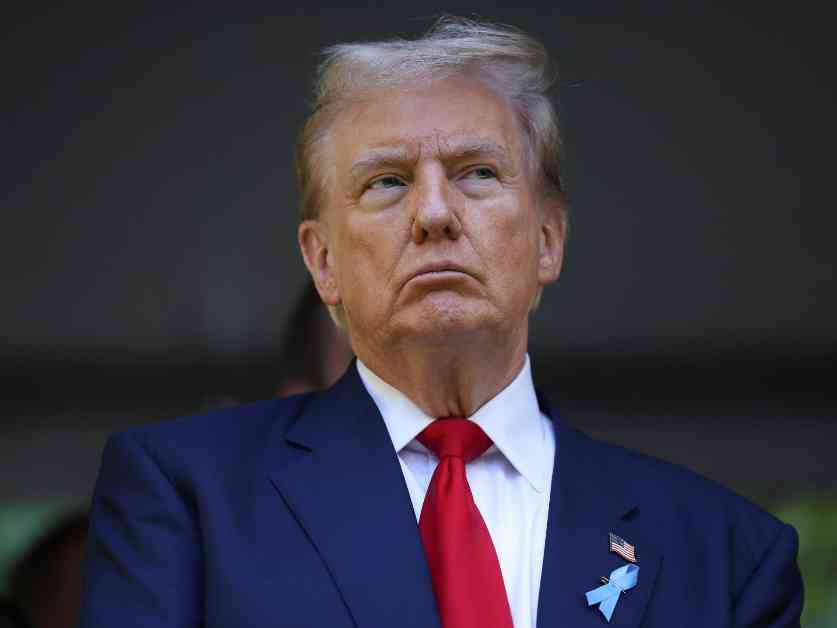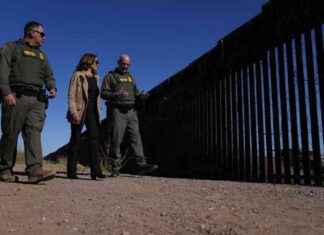Former US President Donald Trump has made a decision to not engage in any more debates with Vice President Kamala Harris after their recent face-off. Despite the Harris campaign’s challenge for another debate following her strong performance, Trump took to the Truth Social platform to declare, “THERE WILL BE NO THIRD DEBATE!”
The first debate between Trump and Harris garnered a significant amount of attention, attracting over 67 million viewers. This event was highly anticipated as it showcased two prominent figures in American politics going head-to-head in a battle of wits and rhetoric.
Trump’s initial debate opponent was President Joe Biden, whom he faced on June 27. However, concerns arose about Biden’s age and performance during the debate, leading to his withdrawal from the race less than a month later. Harris was swiftly chosen as his replacement, setting the stage for her showdown with Trump.
The second debate was scheduled for September 10, and both Harris and Trump agreed to participate despite the changing dynamics of the race. The event took place in Philadelphia, Pennsylvania, where the two candidates clashed on various issues and policies.
Following the debate, many pundits and political commentators gave the edge to Harris, praising her polished performance compared to Trump’s more rambling approach. Jen O’Malley Dillon, the head of the Harris campaign, highlighted the stark choice facing voters in the upcoming election: moving forward with Harris or reverting to the past with Trump.
In the aftermath of the debate, Harris’s camp swiftly challenged Trump to a follow-up debate in an attempt to capitalize on her momentum. However, Trump rejected the proposal in his Truth Social post, asserting that the request for a rematch only came because Harris had “lost.”
Despite Trump’s claims, analysts from both political parties largely agreed that Harris outperformed Trump in the debate. The Democrat managed to provoke her opponent while delivering memorable moments of sharp criticism and humor, showcasing her debating skills and quick wit.
Polls conducted after the debate also indicated that Harris had won over a majority of viewers and voters. A Reuters/Ipsos survey revealed that 53 percent of respondents believed Harris emerged victorious, while only 24 percent thought the same of Trump. Similarly, a CNN flash poll and a YouGov poll showed similar results in favor of Harris.
However, the impact of the debate on the upcoming election remains uncertain. While Harris’s strong performance may have resonated with some voters, it is unclear how it will sway undecided voters in key battleground states. Polls continue to show a close race between the two candidates, with neither having a significant lead.
Despite the positive reception of the debate, a majority of registered voters expressed satisfaction with having only one Harris-Trump debate. Fifty-four percent believed one debate was sufficient, while 46 percent expressed a desire for a second debate.
As the election date draws near, the focus now shifts to campaigning and addressing key issues facing the country. Both candidates will need to engage with voters, present their policies, and make their case for why they should be chosen to lead the nation.
Implications of Trump’s Decision
Trump’s decision to decline further debates with Harris raises questions about his strategy for the remainder of the campaign. By opting out of additional debates, he may be choosing to focus on other forms of campaigning and outreach to voters.
The move also highlights the perceived impact of the first debate on Trump’s confidence and image. His refusal to engage in another debate could be interpreted as a sign of weakness or a lack of willingness to engage in further scrutiny and criticism.
On the other hand, Harris’s camp may view Trump’s decision as a missed opportunity to challenge and confront his opponent on key issues. By refusing to participate in additional debates, Trump may be denying voters the chance to see a more in-depth discussion and comparison of the candidates’ platforms and policies.
Looking Ahead to Election Day
As the election approaches, both the Harris and Trump campaigns will need to intensify their efforts to reach voters and secure their support. With the race remaining tight and undecided voters still up for grabs, every moment and opportunity to connect with the electorate will be crucial.
The fallout from the first debate and Trump’s decision to forego additional debates will undoubtedly shape the narrative leading up to November 5. Voters will be looking to see how both candidates respond and adapt to the changing landscape of the campaign.
Ultimately, the decision to not have any more debates between Trump and Harris sets the stage for a fierce and competitive election season. Both candidates will need to make their case to the American people and convince them that they are the right choice to lead the nation forward.

























